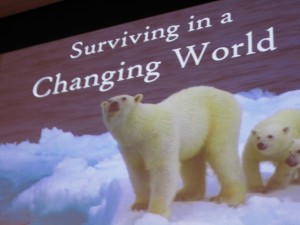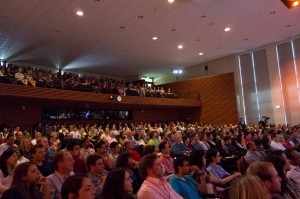Hear more about this story and how it developed on the Peninsula Report podcast >>

Humans are affecting the environment in myriad ways—from putting the oceans in disarray to pushing carbon dioxide levels to new highs—and many fear there’s no going back. But a few speakers at Stanford University’s second annual TEDx event Saturday had a different message: humans can move forward on our rapidly changing planet.
Students, faculty and Bay Area residents flocked to Stanford’s Graduate School of Business to soak in these and many other “Ideas Worth Spreading” — 18-minute talks by 21 dynamic and diverse speakers, including politicians, artists, and eco-thinkers.
The green highlights of the all-day event included Stanford student and solar-house project manager Derek Ouyang, biology professor William Gilly, and “Generation Anthropocene” podcasters Mike Osborne and Miles Traer.
Ouyang revealed the human side of Stanford’s inaugural entry in the U.S. Department of Energy’s Solar Decathlon, a contest that pits collegiate teams against one another to design and build a cost-effective, energy-efficient, solar-powered house. Taking the stage in the first session of TEDxStanford, Ouyang reflected that, as a child, he thought resources like water and power appeared by magic in his house. The Stanford senior, who studies architecture and civil engineering, has come a long way from those “ignorance is bliss” beginnings. Now he wants to design a solar house that does away with that ignorance from the start.
“My idea worth spreading is that homes should be energy efficient, but it’s not just the technology that makes that happen,” Ouyang said after the event. “It’s people and their understanding of their energy narrative.”
Rather than adopt what he called the Silicon Valley attitude—putting smart technology behind the scenes for an effortless user experience—Ouyang decided to make the solar house talk back. The house he helped design is fitted with displays that provide a near-constant stream of salient and meaningful feedback on water and energy usage. That way, the house’s occupants are never in the dark about their resource consumption and how to cut it back.
The solar house is currently under construction on the Stanford University campus.

After lunch, marine biologist William Gilly joined the crowd to outline his favorite species’ five-point plan for surviving in today’s changing oceans. That species is the Humboldt—or jumbo—squid, a multi-talented mollusk found all along North America’s Pacific Coast.
One of the Humboldt squid’s talents is its ability to live and hunt in what is called the oxygen-limited zone. Deep and dark below the surface of the ocean, oxygen levels reach a mere quarter of what they are at the surface. The dry-land equivalent of an oxygen-limited zone would be an elevation 40,000 feet above the Earth’s surface, Gilly explained. To put it into perspective: with oxygen levels that low, “You’d have about fifteen seconds of consciousness.”
As the oceans change, this oxygen-limited zone, along with the deeper and more severe oxygen minimum zone, is expanding toward the sunlit surface. A visual predator, the Humboldt squid could actually reap benefits as their oxygen-starved prey are pushed closer and closer to the light.
Gilly, who is based at Stanford’s Hopkins Marine Station in Pacific Grove, ended his talk by looking into the future—a future with fewer polar bears, but a lot more squid. So humans had better get used to the idea of calamari. Gilly summed up his views: “I think squid have a lot to teach us about our own place in the world—in addition to new ways of cooking them.”
In the third and final session of TEDxStanford, Mike Osborne and Miles Traer tag-teamed a talk on what they call the Anthropocene. The Anthropocene, they propose, is a new geologic age shaped by human activity. But it is also a new way of looking at the world—through “Anthropocene goggles,” as Osborne and Traer dubbed the perspective.
Dozens of graphs showing exponential growth spread across the screen behind the two Stanford geology Ph.D students. Everything—the area of domesticated land, carbon dioxide concentrations, the number of cars, dammed rivers, and even McDonalds restaurants—is spiking upward toward a point that Osborne summed up as: “Oh, ****.”
Humans are changing the face of the planet. “The idea of imagining ourselves as geological forces within the geologic system is kind of cool,” Traer said. “I mean, the idea that we can compare what we’re doing to ice ages or life transforming the planet or anything like that. But then you have to wear these goggles and you have to say, ‘Wow. We are doing all this.'”
Understanding the power of human actions may help us navigate the new world we have created. Traer continued, “That’s ultimately what these Anthropocene goggles are about: what happens next.”
Osborne and Traer produce Generation Anthropocene, a podcast that interviews experts on global environmental change.
TEDxStanford 2013 was produced by Stanford University’s Office of Public Affairs, together with the Graduate School of Business, School of Earth Sciences, and Precourt Institute for Energy. TEDx events are independently organized conferences in the style of TED (Technology, Entertainment and Design) Conferences. All 27 Stanford TEDx talks and performances will be posted online in the coming weeks.
[soundcloud url=”http://api.soundcloud.com/tracks/94648415″ params=”” width=” 100%” height=”166″ iframe=”true” /]
